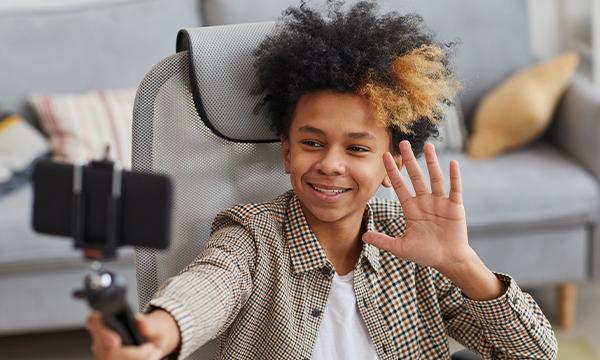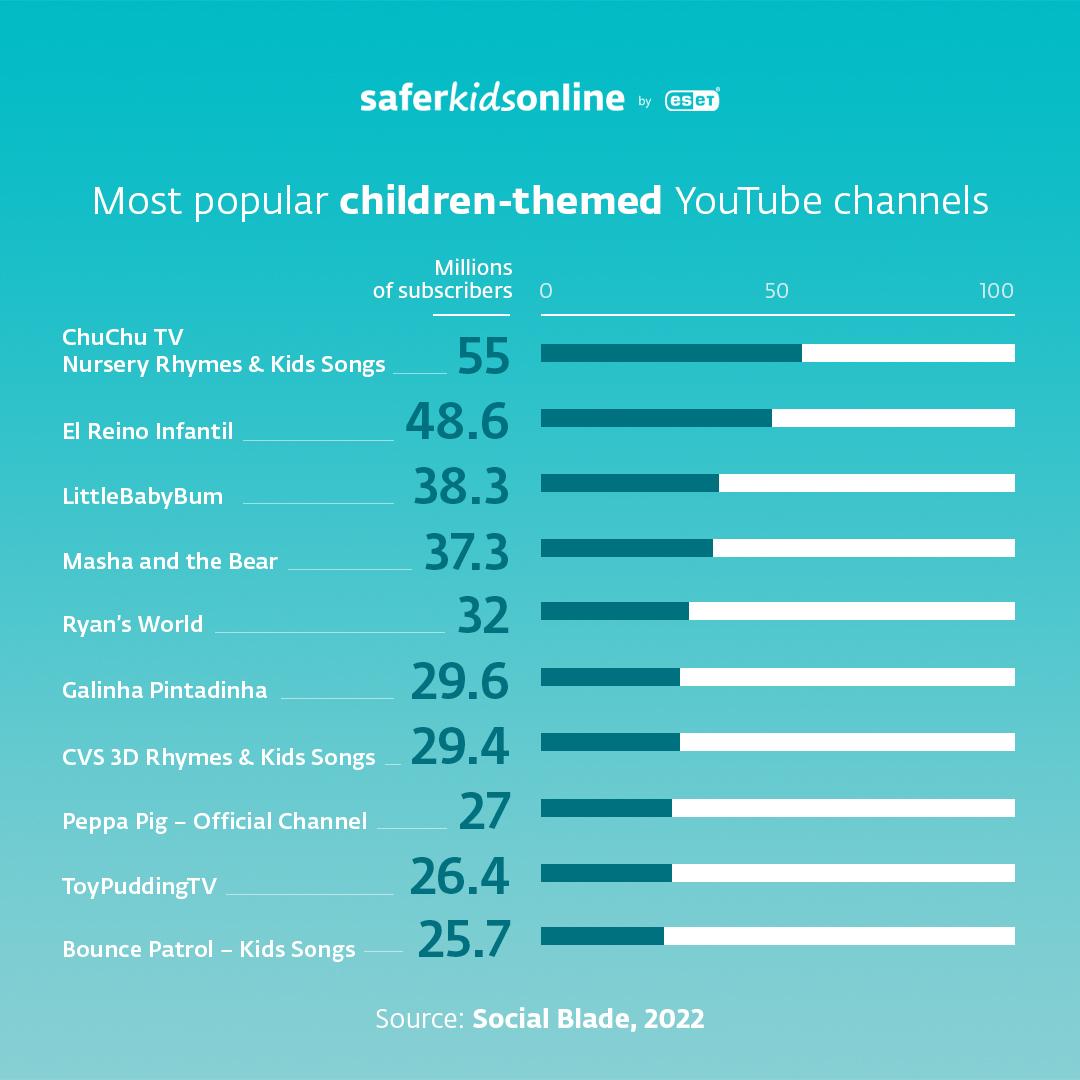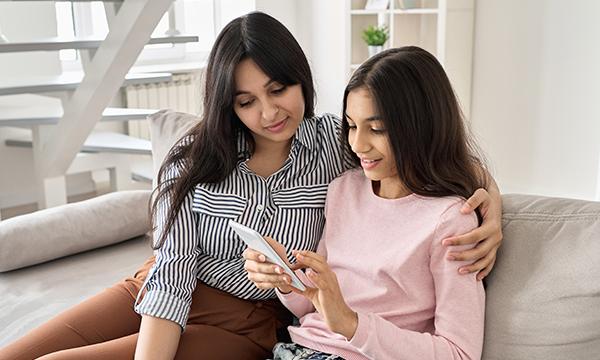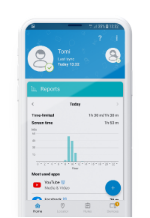"Mom, I want to be a YouTuber." Many parents fear this sentence, and few will want to hear it from their son or daughter. More and more kids want to create their own YouTube channels in the hopes of becoming famous. Teenagers no longer need to become movie stars, they can develop an army of fans by themselves right from their own bedroom. Content that they shoot, edit and share can reach millions of viewers around the world.
But just like any other social network, even the largest online video platform must be used responsibly. What should you discuss with your children before encouraging them to pursue their dream career as a YouTuber? And is it actually a good idea? Identity, self-conception and self-esteem are highly unstable during adolescence, more so than in all other periods of life. Identity is extensively reconsidered and socially reconstructed through external clues.
Teenagers get to know and like themselves through the eyes of their peers and are rather vulnerable to aspects of belonging, social status and popularity. This is why self-presentation via social media is appealing to them. Sharing what they are good at through their YouTube channel might be a great support for their sense of value. On the other hand, it might highlight the importance of external validation of their esteem, and they might behave and show more of what the public would appreciate than they do of how authentically feel. Parents need to make sure their child feels Ok emotionally at the time of deciding whether or not to start the channel, and take a position of partnering with their child for discussion and mentor them in the problems of social media.
Becoming a YouTuber
Creating video content is definitely not a waste of time for young users. Children can gain valuable experience, regardless of whether or not their videos are watched by hundreds of thousands of viewers. Video editing fundamentally encourages creativity and teaches content-makers self-discipline, as they consistent meet their channel’s uploading schedule. Thanks to filming vlogs, young creators also learn techniques of acting, which can be used at school or later at work.
Kids will learn about filmmaking and storytelling, which can lead to a better understanding of contemporary media. Young creators can improve their editing and technical skills while getting a taste of what it takes to do filmmaking. YouTube is a great way to connect with your children and making content a fun activity to share with them. Help your child by looking for tutorials on how to make a good and potentially successful video. However, before letting your kid strive for a YouTuber career, you need to have an important discussion.
First, have the talk. Keep the dialogue as open as possible, not only in this moment of decision-making but throughout early childhood. If your young child follows an influencer, consider following the person too and keep an eye on what they share or post. If you find inappropriate content, be there to explain it to your child and teach them what’s right and what’s wrong.

Make sure your child sees you as a trusted advisor in case anything in their online life goes amiss. Be curious, and ask your child about their dreams and ambitions. What is the reason they want to follow this path and what type of content would they create? Does it fit well with the hobbies, skills and interests you know your child has and enjoys? What would YouTubing mean to them, what they expect will be a win, and what will be the costs? Who do they look up to on YouTube and why? What specific channels do they watch on a regular basis? There are many cases of young creators who became rich and famous very early. Their hobby turned into a full-time job, which can be very difficult on a child, teenager or an adult. For instance, the ten-year-old protagonist of Ryan’s World channel already has over 33 million subscribers.

Nonetheless, aspiring young creators should not count on achieving this type of fame. Pursuing stardom puts pressure on children, especially when represented in a numerical sense with views, subscribers and comments. Explain to them how looking for the approval of other people is not the ideal way to approach creating any form of content or art. Try not to moralize but be in respectful cooperation. Discuss these issues with them and share stories about the other side of fame to help your child perceive the activity of YouTubing in a more complex way. Kids need to learn that they are creating videos primarily for themselves for fun, and for exploring and applying their creativity and skills. When you are on the same page, you are at the right time to set up some basic rules.
Follow the guidelines
Children between 13 and 17 years of age need parental permission to start a YouTube account. If your child is under 13 and you decide it is a good idea to proceed, the only way is for you as their parent to set up and manage the channel yourself. YouTube follows community guidelines addressing everything from misinformation and sensitive content to spam and deceptive practices. Go through these instructions with your child, so that they can join the worldwide community, and help to keep YouTube an enjoyable place for everyone. Help your children understand what is and isn't okay to share on the platform. Explain to them they should avoid posting personal information. Data such as their home and school address or names of family members should not appear on their channels under any circumstances.
There are things young creators should consciously keep private in order to stay safe online. Their own privacy is not the only thing at stake, they also need always be respectful on the internet. Be the supportive guide who shows them how to behave on social networks including YouTube. When you agree on the basics, start a tutorial mode. Review your child’s content before it is published. Work on the first chapter of their YouTube journey together and see what aspects of the videos get positive feedback. You can even start by listing the content as private and show it only to friends and family members before going public for everyone to see. You can change the setting for a video from Private to Public at any time.
Restrict inappropriate comments
YouTube provides many functions that will help you and your little YouTuber. For example, you can turn off comments under your videos or hide specific viewers. Like all social media, YouTube is full of trolls who like to post hateful comments to make creators feel bad. And you probably don’t want your teenager to read unnecessary slurs under their videos. Functions like these will help protect children from bullying and other inappropriate reactions. “Supervise your child by taking a harm-reduction approach, and by setting an example of good practice, by telling pros and cons truthfully. If you restrict public commenting, that does not mean young YouTuber won’t start becoming prepared also to this side of the coin. Talk about the reason why you are not allowing comments on the channel. When you think of opening the channel for public commenting, check twice, make sure you have the capacity and will to be a moderator of this channel discussion for your child,” says psychologist Jarmila Tomkova.

How to restrict inappropriate content when younger children watch YouTube? Simply download YouTube Kids and engage with its clear and simple settings interface. You start by typing in your child’s age; this is an easy way to let your kids explore interesting content suitable for them. Whether you’re setting up a YouTube channel for a child or just allowing them to watch their favorite creators, always remember to be there for them. Go throught the process with them and try to be supportive. If you think they are not ready for their own channel, show them that you will help them follow their dream in a few years.





